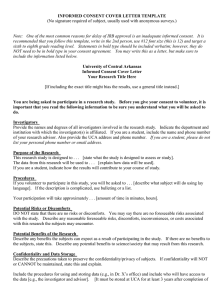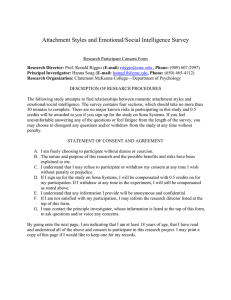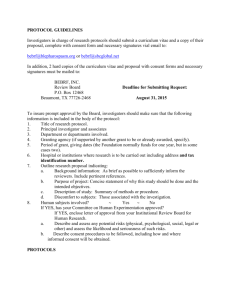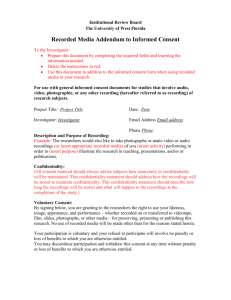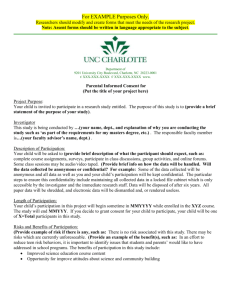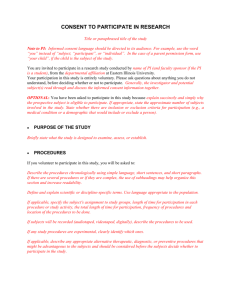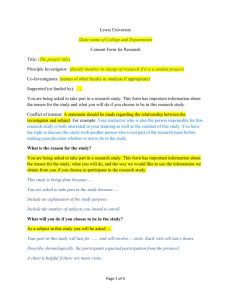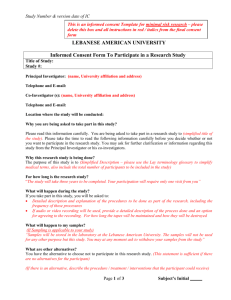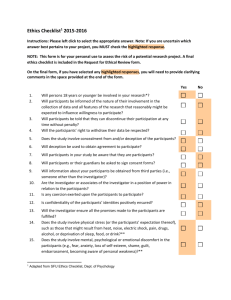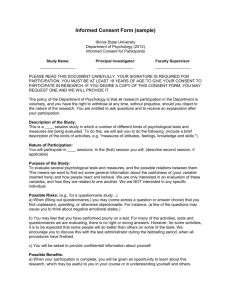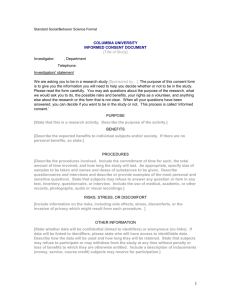Clinical Trial Quality and Compliance: An FDA Perspective
advertisement
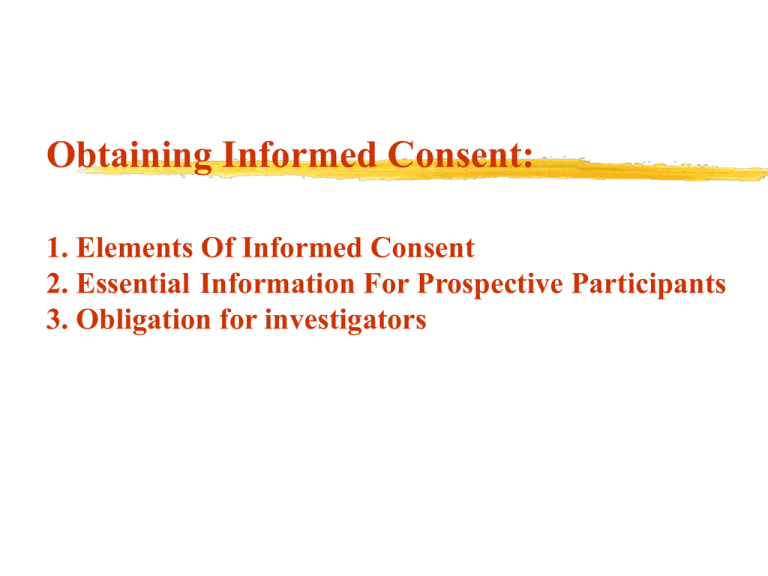
Obtaining Informed Consent: 1. Elements Of Informed Consent 2. Essential Information For Prospective Participants 3. Obligation for investigators ELEMENTS OF INFORMED CONSENT 1. DISCLOSURE In general necessary items to disclose include: a) the patient’s current medical status including the likely course if no treatment is provided. b) the contemplated procedure or medication c) alternative available procedures or medication d) anticipated risks and benefits of both e) a statement offering an opportunity to ask furth questions f) in case of research, his right to withdraw any time g) a professional opinion about the alternatives 2. COMPREHENSION 7th grade level (US Standard) Language understood by the subject Oral or written quizzes to assess comprehension Use of educational intervention prior to getting consent Allowed into research environment to experience routine and procedures 3. VOLUNTARINESS - The patient must of his own free will make a choice without being unduly pressured by anyone else. Being free in making a decision means that the patient owns the decision, that the decision is the patient’s alone, that the patient has chosen the option based on the information disclosed to him/her. 4. COMPETENCE - patient’s capacity for decision making. One is considered competent when (a) one has made a decision (i.e. one can choose between alternatives) (b) one has the capacity to justify one’s choice (i.e, give reasons for one’s choice) (c) one justifies one’s choice in a reasonable manner Before requesting an individual's consent to participate in research, the investigator must provide the following information, in language or another form of communication that the individual can understand: 1.that the individual is invited to participate in research, the reasons for considering the individual suitable for the research, and that participation is voluntary; 2. that the individual is free to refuse to participate and will be free to withdraw from the research at any time without penalty or loss of benefits to which he or she would otherwise be entitled; 3. the purpose of the research, the procedures to be carried out by the investigator and the subject, and an explanation of how the research differs from routine medical care; 4. for controlled trials, an explanation of features of the research design (e.g. randomization, double-blinding) and that the subject will not be told of the assigned treatment until the study has been completed and the blind has been broken; 5. the expected duration of the individual’s participation (including number and duration of visits to the research centre and the total time involved) and the possibility of early termination of the trial or of the individual’s participation in it; 6. whether money or other forms of material goods will be provided in return for the individual's participation and, if so, the kind and amount; 7. that, after the completion of the study, subjects will be informed of the findings of the research in general, and individual subjects will be informed of any finding that relates to their particular health status; 8.that subjects have the right of access to their data on demand, even if these data lack immediate clinical utility(unless the ethical review committee has approved temporary or permanent non-discloser of data, in which case the subject should be informed of , and given, the reasons for such nondisclosure); 9. any foreseeable risks, pain or discomfort, or inconvenience to the individual (or others) associated with participation in the research, including risks to the health or well-being of a subject’s spouse or partner; 10. the direct benefits, if any, expected to result to subjects from participating in the research 11. the expected benefits of the research to the community or to society at large, or contributions to scientific knowledge; 12. whether, when and how any products or interventions proven by the research to be safe and effective will be made available to subjects after they have completed their participation in the research, and whether they will be expected to pay for them; 13. any currently available alternative interventions or courses of treatment; 14. the provisions that will be made to ensure respect for the privacy of subjects and for the confidentiality of records in which subjects are identified; 15. the limits, legal or other, to the investigators’ ability to safeguard confidentiality, and the possible consequences of breaches of confidentiality; 16. the sponsors of the research, the institutional affiliation of the investigators, and the nature and sources of funding for the research; 17. the possible research uses, direct or secondary, of the subjects medical records and of biological specimens taken in the course of clinical care. 18. whether it is planned that biological specimens collected in the research will be destroyed at its conclusion, and, if not, details about their storage (where, how, for how long, and final disposition) and possible future use, and that subjects have the right to decide about such future use, to refuse storage, and to have the material destroyed. 19. whether the investigator is serving only as an investigator or as both investigator and the subject’s physician; 20. the extent of the investigator's responsibility to provide medical services to the participant; 21. that treatment will be provided free of charge for specified types of researchrelated injury or for complications associated with the research, the nature and duration of such care, the name of the organization or individual that will provide the treatment, and whether there is any uncertainty regarding funding of such treatment. 22. in what way, and by what organization, the subject or the subject’s family or dependants will be compensated for disability or death resulting from such injury (or, when indicated, that there are no plans to provide such compensation); 23. that an ethical review committee has approved or cleared the research protocol. Information • • • • • • • The aims and methods of the study; Sources of funding and possible conflicts of interest; The institutional affiliations of the researcher; Anticipated benefits and potential risks and follow-up of the study; Discomfort that trial participation may entail; Right to abstain from taking part in the study, or withdraw from it at any time without any reprisal; and Each country’s local context should be considered in defining national policies on the ethics of clinical and biomedical research involving human participants. • Obligation for investigators Refrain from unjustified deception, undue influence, or intimidation; That seek consent only after ascertaining that the prospective subject has adequate understanding of the relevant facts and of the consequences of participation and has had sufficient opportunity to consider whether to participate;
